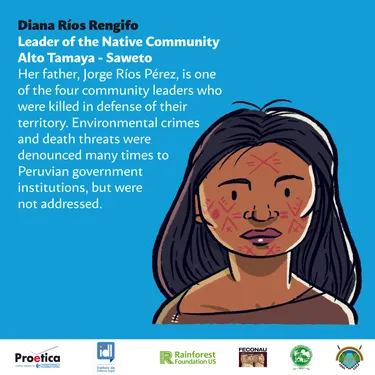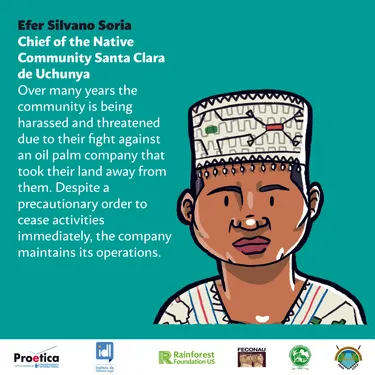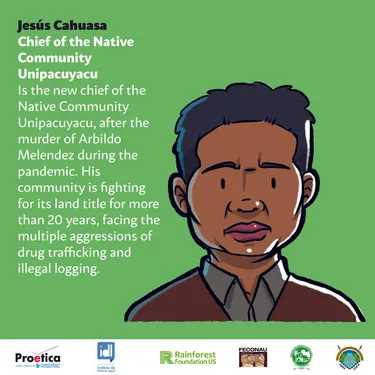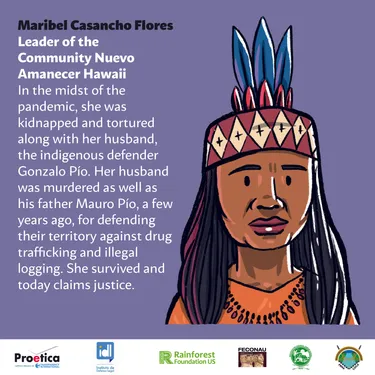In Peru, Transparency International is fighting to defend the human rights of communities vulnerable to environmental destruction, land grabbing and violence
Corruption kills.
This sad fact is particularly true for vulnerable communities like the indigenous peoples of the Amazon.
Proética, Transparency International’s national chapter in Peru, is taking the intersection of corruption and violations of the rights of indigenous peoples to the Inter-American Council on Human Rights (IACHR), in a public hearing on 6 October 2020 (register here).
Along with indigenous organisations, they will present four cases in which Amazonian indigenous leaders came under violent attack after speaking up about illegal activities on their ancestral homelands. This is the first presentation to a regional body to demonstrate how corruption affects indigenous people in a region where illegality, corruption and weak state control are the norm.
The cases concern four indigenous communities that have been fighting for decades for recognition of their right to their ancestral territories. The government has not only taken an unjustifiably long time to grant communities like these titles to their lands, but has actively given their land away to others who can make millions from drug trafficking and illegal logging. A publication by Proética shows that the process for assigning land titles in Peru is beset by irregularities at authorities such as the regional governments.
These cases are not isolated events, but rather illustrate the workings of a network of environmental crimes in which the Peruvian State and its officials play a decisive and determining role. The State is responsible not only for its weak attempt to protect the human rights of native communities, but also for the active participation of public officials in systematic corruption. This has grave consequences for the human rights of indigenous peoples and contravenes Peru’s national and international obligations
Magaly AvilaDirector of the Environmental Governance Programme at ProéticaTweet this
The real-life stories that will be presented to IACHR represent the struggle indigenous communities continue to face in demanding the restitution of their territories. They also highlight the failure of the Peruvian state to fulfil its obligation to protect ancestral lands and the lives of its citizens.
Diana Ríos Rengifo

In 2014, four leaders of the Community of Alto Tamaya-Saweto who had been demanding recognition of their lands since 2002 were tortured and murdered: Edwin Chota Valera, Jorge Ríos Pérez, Leoncio Quintisima Meléndez and Francisco Pinedo Ramírez. They had sent more than 100 letters to authorities at all levels of government but they were rebuffed with excuses. Some official said they would only visit the area to make an assessment if the community paid the costs of their transportation and food.
In 2003, the government granted various companies more than three million hectares of land. This included 80 per cent of the ancestral territory of the Alto Tamaya-Saweto community. Illegal logging on the community’s land started soon after. The leaders continued their campaign for justice, resulting in retaliation that cost them their lives.
Efer Silvano Soria

Despite being officially recognized as a community in 1975, the community of Santa Clara de Uchunya has not been granted the title to their ancestral territory. However, the Regional Directorate of Agriculture of Ucayali granted land permits to private palm oil companies in a murky process that lacked transparency. Illegal deforestation ensued, with the companies involved making death threats against the community’s leaders when they complained. Threats and acts of intimidation against the leaders of this community continue to this day.
Deforestation, land grabs, exploitation: in the province of Ucayali in Peru, corruption is widespread. International investors have snapped up huge tracts of land using dubious methods that leave local farmers destitute.
Externally hosted content may include ads. These aren’t endorsed by or reflect Transparency International’s views.
Jesús Cahuasa

In Unipacuyacuthis year, in the midst of a State of Emergency declared due to the COVID-19 crisis, indigenous leader Arbildo Meléndez was found dead from a gunshot wound. His grandfather was murdered in 2016. For years, Arbildo Meléndez had been petitioning the government for the title to the community’s lands while denouncing environmental crimes committed in its ancestral territory, as well as the actions of the Peruvian State.
Maribel Casancho Flores

Decades of injustice and dispute over the right to maintaining ownership over their indigenous lands continues for the commmunity of Amanecer Hawaii. This year, their leader Gonzalo Pio, together with his wife, Maribel Cancho Flores, were kidnapped and tortured. Mirabel was fortunately able to escape, but her husband, Gonzalo, like his father only a few years prior, was brutally murdered for standing up against illicit activities taking place on the community’s ancestral lands.


